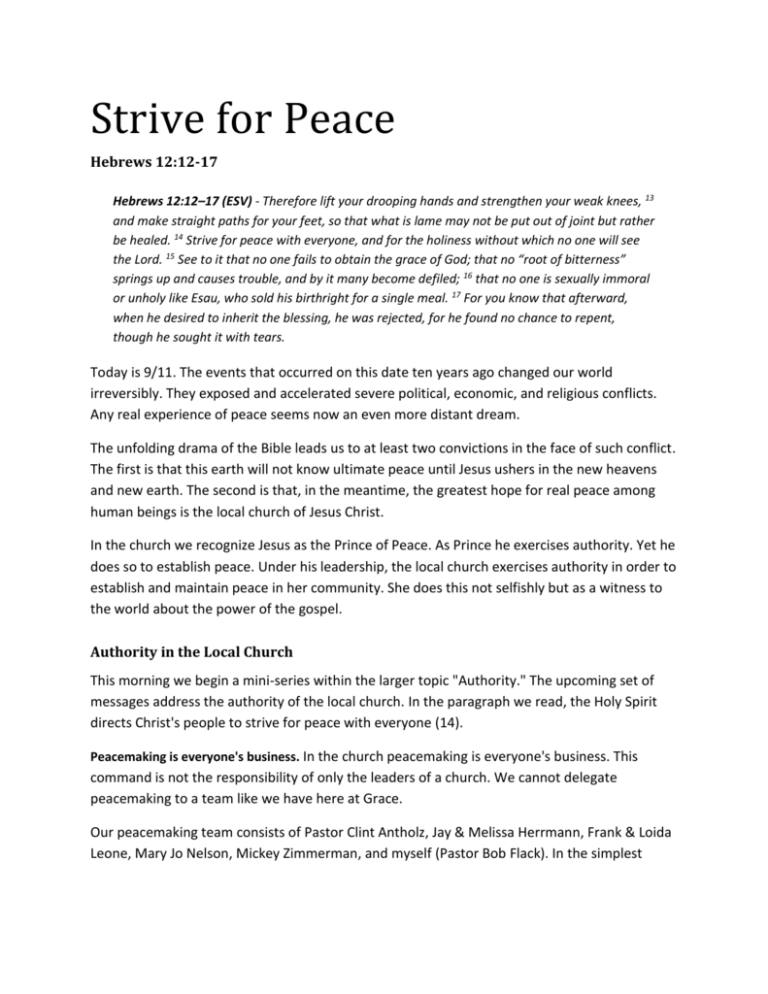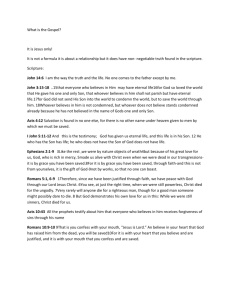Strive for Peace - Grace Baptist Church
advertisement

Strive for Peace Hebrews 12:12-17 Hebrews 12:12–17 (ESV) - Therefore lift your drooping hands and strengthen your weak knees, 13 and make straight paths for your feet, so that what is lame may not be put out of joint but rather be healed. 14 Strive for peace with everyone, and for the holiness without which no one will see the Lord. 15 See to it that no one fails to obtain the grace of God; that no “root of bitterness” springs up and causes trouble, and by it many become defiled; 16 that no one is sexually immoral or unholy like Esau, who sold his birthright for a single meal. 17 For you know that afterward, when he desired to inherit the blessing, he was rejected, for he found no chance to repent, though he sought it with tears. Today is 9/11. The events that occurred on this date ten years ago changed our world irreversibly. They exposed and accelerated severe political, economic, and religious conflicts. Any real experience of peace seems now an even more distant dream. The unfolding drama of the Bible leads us to at least two convictions in the face of such conflict. The first is that this earth will not know ultimate peace until Jesus ushers in the new heavens and new earth. The second is that, in the meantime, the greatest hope for real peace among human beings is the local church of Jesus Christ. In the church we recognize Jesus as the Prince of Peace. As Prince he exercises authority. Yet he does so to establish peace. Under his leadership, the local church exercises authority in order to establish and maintain peace in her community. She does this not selfishly but as a witness to the world about the power of the gospel. Authority in the Local Church This morning we begin a mini-series within the larger topic "Authority." The upcoming set of messages address the authority of the local church. In the paragraph we read, the Holy Spirit directs Christ's people to strive for peace with everyone (14). Peacemaking is everyone's business. In the church peacemaking is everyone's business. This command is not the responsibility of only the leaders of a church. We cannot delegate peacemaking to a team like we have here at Grace. Our peacemaking team consists of Pastor Clint Antholz, Jay & Melissa Herrmann, Frank & Loida Leone, Mary Jo Nelson, Mickey Zimmerman, and myself (Pastor Bob Flack). In the simplest terms, we on the team help the whole body practice peacemaking through the gospel of Jesus Christ. Peacemaking is more than just an individual responsibility. The local church as a whole has authority to establish and maintain peace. We tend to read the Bible and apply it in very private and individual ways. We overlook how the Bible addresses specific communities in specific places to act together in obedience. The passage we read this morning is an example. If we read this only thinking about individual obedience we miss the rich significance of these words for how we are to live as a local church. Seeing this Passage in the context of the Local Christian Community I want to convince you that the primary intention of this passage is to encourage a peaceful local church. The main command in this paragraph is "strive for peace with everyone." Who is "everyone?" Certainly, believers in Jesus Christ should be peacemaking wherever they go with anyone they meet. But the word "strive" or "pursue" is a strong word. The goal of peace with everyone is like a finish line for a runner in a race. It is the achievable goal. If "everyone" refers to everyone in the world then striving for peace with everyone seems a vague and unattainable goal. Instead, everyone refers to everyone in the local Christian assembly. The theme of pursuing peace within the local assembly is common in the New Testament. Paul writes to the Romans, “So then let us pursue what makes for peace and for mutual upbuilding.”1 Mutual upbuilding is what Christians do when they commit to one another in a local fellowship. We do not build up the world. We bring the world to Christ. We build up each other in the church. To do this we pursue peace. Paul wrote to Timothy, a pastor, “So flee youthful passions and pursue righteousness, faith, love, and peace, along with those who call on the Lord from a pure heart.”2 “Those who call on the Lord from a pure heart” are primarily the people of his local church. Striving for peace with everyone primarily happens in the local church. The command of verse 15 reinforces this. "See to it that no one . . . " The writer goes on to name four dangers. See to it that no one fails to obtain the grace of God (v. 15) See to it that no root of bitterness springs up (v. 15) See to it that no one is sexually immoral (v. 16) 1 Romans 14:19 (ESV) 2 2 Timothy 2:22 (ESV) See to it that no one is unholy like Esau (v. 16) Notice that he does not say, "don't fail to obtain; don't be bitter; don't be sexually immoral; don't be unholy." Rather the command is "see to it that no one" falls into these dangers. So again we ask, "no one out of what group?" Christians are not called to hold the people of the world accountable for their morality. We are called to take the gospel to the world and bring repentant sinners to faith in Christ. The accountability described here happens in the local church where professing believers bind themselves in a covenant to pursue holiness. The phrase "see to it" translates a single word which means to exercise oversight and authority. If you were here last week you'll remember that Jesus was referred to in 1 Peter 2:25 as the overseer of our souls. Peter uses the related noun. Here in Hebrews it is the verb. We are to keep watch over each other to make sure that no one among us gets into trouble. This kind of accountability happens in the local church. Consider too that the root of bitterness in verse 15 does not refer to a general spirit of bitterness. The root is a person who gains influence within the group and causes trouble among them. That conclusion flows from the Old Testament passage quoted: Deuteronomy 29:18–19 (ESV) ... Beware lest there be among you a root bearing poisonous and bitter fruit, one who, when he hears the words of this sworn covenant, blesses himself in his heart, saying, ‘I shall be safe, though I walk in the stubbornness of my heart.’ The warning is against specific individuals among the people of God. In Hebrews, the people of God gather in the local church. When we begin to see that this passage primarily applies to the local church, even the opening verses take on a new significance. Hebrews 12:12–13 (ESV) - Therefore lift your drooping hands and strengthen your weak knees, 13 and make straight paths for your feet, so that what is lame may not be put out of joint but rather be healed. Drooping hands, weak knees, and lame feet refer to individuals within the local church body not to conditions common to Christians as individuals. This is similar to Paul's comparison of the local church as an interconnected body with many parts in 1 Corinthians 12. The local church and her members have the authority to watch over each other in order to pursue and maintain peace. How does this work out? How is such authority exercised? What does a peaceful local church do to establish and maintain peace? This paragraph gives three answers. A peaceful local church: Strengthens Strugglers, Looks Distinctive and Confronts Challenges to Peace. I know that we need to grow significantly in all three here at Grace. We have a long way to go. But as we relish his word and rely on his Spirit we will see these qualities develop in this local church. A Peaceful Local Church Strengthens Strugglers Hebrews 12:12–13 (ESV) - Therefore lift your drooping hands and strengthen your weak knees, 13 and make straight paths for your feet, so that what is lame may not be put out of joint but rather be healed. The church that pursues peace will recognize that people will come into her fellowship who have been ravaged by all kinds of conflict. The church expects to have to deal with conflict. Lives are messy. Relationships are in a shambles. Sin has destroyed and defiled. The stronger believers respond with help to resolve conflicts and heal relationships. Galatians 6:1–2 (ESV) - Brothers, if anyone is caught [trapped] in any transgression, you who are spiritual should restore him in a spirit of gentleness. Keep watch on yourself, lest you too be tempted. Bear one another’s burdens, and so fulfill the law of Christ. Jesus himself set the example in this. Matthew points to Jesus as the Servant of Isaiah's prophecy: Matthew 12:19–20 (ESV) - He will not quarrel or cry aloud, nor will anyone hear his voice in the streets; 20 a bruised reed he will not break, and a smoldering wick he will not quench, until he brings justice to victory; Note how He refuses conflict but instead supports the crushed stem and the dying flame. Christ's church has the same responsibility. If you don't know how to do this, join the peacemaking class that meets at 11:00 every Sunday. Stop by the peacemaking team table in fellowship hall and pick up a card that will help you walk through confession and forgiveness with a brother or sister. A peaceful local church will strengthen strugglers. A Peaceful Local Church Looks Distinctive A peaceful local church looks distinctive. Verse 14 says that at the same time we pursue peace we are to pursue holiness. Holiness is the biblical word to describe what is separate from sin. Holiness stands out because it is distinctive. God is holy. His church is called a holy nation (1 Peter 2:9). It has a defined citizenship. And those citizens live life in a way that is distinctive from the world. We conclude immediately that pursuing peace does not mean that anything goes. "We just all get along by letting everyone do what they want to do. Live and let live." We cannot buy into this lie. A church pursues peace and holiness at the same time. The two go hand in hand. They do not contradict. This does not mean that a church looks distinctive by all dressing alike or all subscribing to list of things we don't do. Our distinctiveness is our love. We pursue peace because there is genuine love within a local church. Her members have made a covenant with each other. Each member understands the gospel. He recognizes that he was once an enemy of God. He admits his rebellion. He rejoices that God sent Jesus Christ to take the curse of sin on the cross and establish peace with God. He celebrates the resurrection of Jesus as the proof that all his promises will come true. He delights in the new covenant relationship with God based on forgiveness and reconciliation. Because God has shown mercy to him he can show mercy to others in the body of Christ. Here at Grace our covenant begins, “We will walk together in brotherly love.” We have committed to one another so that when we have to deal with difficult issues we don’t just walk away and head for another church. We confront each other about sin because there is an ongoing practice of love. The world sees this and is amazed. Here are people who live to high moral standards but do it not with self-righteous pride but with humble service to each other. They resolve conflicts in a loving way. They pursue peace. This distinguishes them from the world. And they do this because there is the danger that some may claim to be following Christ but they may in the end, they fail to see the Lord. Spiritual imposters exist in any church. That brings us to the third description of a peaceful church. A Peaceful Local Church Confronts Challenges A peaceful local church confronts challenges. We cannot miss this emphasis in the paragraph. We have acknowledged that we have a responsibility to strengthen those who are struggling in a local body. But there are also people in a church that challenge the holy peace. They must be confronted. The members of a church must exercise authority to exclude or remove those who: Fall short of the grace of God (15). There are people who come into the local church and even join the church but there is no evidence in their lives that they have been born again. The grace that empowers for holiness is not at work in their lives. They remain unrepentant about sin. Their lives challenge the peace of the church. Are roots of bitterness (15). They spring up and with their grumbling they defile many. Their attitude poisons the peace of the church. Are sexually immoral (16). They threaten the peace of the church by ravaging relationships through sexual abuse, stalking, sex outside marriage, and all forms of pornography. Others are unholy (16). They are like Esau who took something sacred -- his birthright -- and treated it as common currency that he could trade for food. These kinds of people persist in treating the things that are holy to the local church -- the Lord's supper, baptism, the corporate worship of God -- as common and of little value. They too disturb the peace of the local church. The members of a local church must take the initiative to confront these kinds of challengers. Such a confrontation must have the immediate goal of restoring rather than destroying. The confrontation must occur in love. It must follow and orderly process. It must involve witnesses. It must involve plenty of opportunity for repentance. According to Matthew 18 it is the church as a whole that has the authority to dis-fellowship one who threatens the peace of the church. This is a solemn and hopefully rare exercise of the church's authority. But if a church membership fails to confront challenges, then conflict will eventually overrun her. Poison spreads. A peaceful church will confront challenges and resolve conflict in a biblical way. Grace's Peacemaking Initiative If your heart longs to work toward that kind of Christian community what should you do? How do you engage in a church that is taking initiative to pursue peace? 1. Make peace with God by trusting in Jesus and what He did to save you. 2. Join a church that seeks to live distinctively as a community of Christ followers. If you live here our area, join this church. Come into the protection and accountability of our covenant. 3. Resolve conflicts with fellow church members. Seek help from the peacemaking team as needed. Pick up resources from the table in Fellowship Hall. Join the class that meets at 11:00. Go through a peacemaking study in your care group. If you would like help with a specific conflict, send a message to peacemaker@gracebchurch.org. 4. Lovingly confront those who challenge the peace of Christ's church. This does not begin at a church business meeting. It begins in between between two people who have decided to live committed to Christian community. Jonathan Leeman writes in a book titled "The Church and the Surprising Offense of God's Love:" The world thinks it understands love, just like it thinks it loves God. Yet it doesn’t. It only understands idolatrous phantoms or fabrication of them, shadows that bear some of the shape but little of the substance. The local church, therefore, is called to be a three-dimensional display of true love. And the practices of church membership and discipline are precisely what help to make the local church visible and clear. They demonstrate love’s demands.... Church membership and discipline give structure or shape to what it means to be a Christian—a person who displays God’s love.








